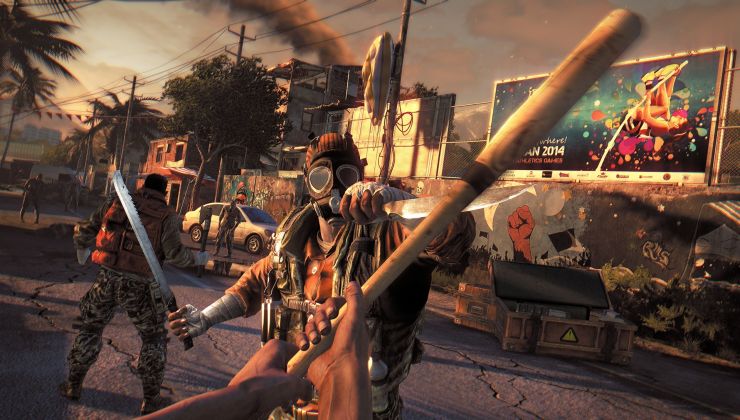Recently at the Tokyo Game Show Valve developer Pierre-Loup Griffais spoke to CNBC about PC gaming and Steam Deck, here's what was said during the interview.
As far as I can see, this was only posted to X/Twitter and the audio quality is not the best due to background noise and the first part the interview is simply giving an overview of what the Steam Deck can do and provide for gamers. The interesting bits come later so here's just a quick quote summary of quotes from Griffais:
- When talking about the power of SteamOS - "we would like to work with other hardware manufacturers, so they can adopt SteamOS in the future".
- On VR: "for Steam Deck we don't really have a VR story to it, but it's definitely something we want to explore more in the future".
- For the future: "we're not really seeing growth stop after COVID, so for us it's really important to keep working on the current version of the Steam Deck, put together software updates we just released a big SteamOS 3.5 update that's added new features we're going to keep doing that - but also work on the hardware side supply chain, retail presence, work with distributors to get the Deck available worldwide and expand its audience so we're going to be focusing on that short term - in the future we're looking at the PC market and where technology is going and see if there's any interesting opportunities there".
- When asked about console cycles, games being higher-end and Steam Deck upgrades: "right now we're looking at this performance target that we have as a stable target for a couple years, we think that it's a pretty sweet spot in terms of being able to play all the experiences from this new generation and so far the new releases coming out have been great experiences on Steam Deck. We're working with developers on future releases and we're monitoring the feedback there but so far it's been pretty good on the horsepower front".
Even though Valve say the current Steam Deck is their stable target for a couple of years, it was originally released in February 2022 so it will already be 2 years old next February. So could we potentially see a Steam Deck 2 in 2025? Seems like that might be a good time for it.
Clearly the current generation has a lot of life left in it and Valve plan to continue to upgrade the software and just keep expanding the availability of the current Steam Deck. And if they do get a more generic SteamOS install out, pulling in new hardware vendors would be great for consumer choice.
We have seen some teasers for Valve Galileo and Sephiroth though so something is cooking, although it's very likely new VR hardware.
I love my Deck but I do wonder just how many years it really has in it to stay relevant. It's a delicate balance between keeping a good hardware target and being able to actually handle games until the next, but I feel we're already seeing it at the end of its limit with newer releases, so a few years from now does seem a long way off.I think it primarily depends on whether or not developers are willing to optimize their games for the Steam Deck.
I love my Deck but I do wonder just how many years it really has in it to stay relevant. It's a delicate balance between keeping a good hardware target and being able to actually handle games until the next, but I feel we're already seeing it at the end of its limit with newer releases, so a few years from now does seem a long way off.I think it primarily depends on whether or not developers are willing to optimize their games for the Steam Deck.
This is a great point, I mean look at the Switch it was released on 2017 (there have been refreshes but nothing major) and it's still going strong. Not so well with MK1 and such it shows that developers can care if the market is there.
we're not really seeing growth stop after COVID, so for us it's really important to keep working on the current version of the Steam Deck, put together software updates we just released a big SteamOS 3.5 update that's added new features we're going to keep doing that...
Are they talking about Steam as a whole or the Steam Deck sales figures? The first is great, but the latter would be awesome news.
Last edited by Mohandevir on 22 Sep 2023 at 12:28 pm UTC
but also work on the hardware side supply chain, retail presence, work with distributors to get the Deck available worldwide and expand it's audience so we're going to be focusing on that short term
That's really been the biggest flaw with the Deck so far: that huge chunks of the world that might want the Deck can't get one.
i hope they wait at least 5 years, but the competition surely is making some pressure with their marketing, the fact that people dont know how good the UX is until they experience it help nothing.
Bingo, you said the same thing that I have been saying for a long time. People are so focused on hardware or node size that they forget that once we reach the nm node limit, the only option is to either go fully chiplet or optimize games. It doesn't matter how strong the hardware is; it will come to bite us in the end if developers are not willing to put in the effort to optimize their software, and the craziest part is that nobody wants to buy a $1,000 handheld just to buy a game that wouldn't play on the steam deck knowing how high the inflation is.I love my Deck but I do wonder just how many years it really has in it to stay relevant. It's a delicate balance between keeping a good hardware target and being able to actually handle games until the next, but I feel we're already seeing it at the end of its limit with newer releases, so a few years from now does seem a long way off.I think it primarily depends on whether or not developers are willing to optimize their games for the Steam Deck.
Either you try to please the people who want expensive luxury items or the people who want something with value that isn't expensive.
Last edited by jams3223 on 22 Sep 2023 at 8:12 pm UTC
That's under the assumption ARM is more power efficient than modern x86_64 processors, not sure if that's actually true anymore I haven't really looked into the subject much and AMD really seems to be absolutely killing it in the erea of power efficiency
I anticipate the Deck will become at least 5 years old before they really start considering a full on Deck 2 in any case.
i hope they wait at least 5 years, but the competition surely is making some pressure with their marketing, the fact that people dont know how good the UX is until they experience it help nothing.
Perhaps if projects like Box86 improve, they can make a Deck lite running off ARM. Something smaller, passively cooled, super battery life, focused on being a handheld Steam Link but fully capable of playing PC games from at least the 2010s.
That's under the assumption ARM is more power efficient than modern x86_64 processors, not sure if that's actually true anymore I haven't really looked into the subject much and AMD really seems to be absolutely killing it in the erea of power efficiency
I anticipate the Deck will become at least 5 years old before they really start considering a full on Deck 2 in any case.
its still more efficient, otherwise apple wouldnt make m1, but the issue is emulatiog another arch while being more efficient at the same time? doubt it.
The current generation of GPUs (RDNA 3) and CPUs (Zen 4) really aren't an impressive leap over the generation the Steam Deck has (RDNA 2 and Zen 3), so I think Valve is smart to wait. Both AMD and nVidia are experiencing lackluster sales this generation, so it would seem the market as a whole looked at the upgrades on offer and went "meh."
As I have real problems destingushing between videos with or without pseudo-raytracing applied, I can really relate to this. At the moment, I'm looking for an upgrade for VR only, yet I'll absolutely wait till I know what Deckard will be.
couple can mean 2, or mean a few, a lot...
i hope they wait at least 5 years, but the competition surely is making some pressure with their marketing, the fact that people dont know how good the UX is until they experience it help nothing.Perhaps if projects like Box86 improve, they can make a Deck lite running off ARM. Something smaller, passively cooled, super battery life, focused on being a handheld Steam Link but fully capable of playing PC games from at least the 2010s.
That's under the assumption ARM is more power efficient than modern x86_64 processors, not sure if that's actually true anymore I haven't really looked into the subject much and AMD really seems to be absolutely killing it in the erea of power efficiency
I anticipate the Deck will become at least 5 years old before they really start considering a full on Deck 2 in any case.
its still more efficient, otherwise apple wouldnt make m1, but the issue is emulatiog another arch while being more efficient at the same time? doubt it.
Are there ARM chips in the league of M1 available to anyone but Apple by now? Afaik, there is nothing in that league, especially with the optimizations for x86 emulation, like register handling in hardware. Box86 certainly is impressive, but hardware support is hardware support.
Are there ARM chips in the league of M1 available to anyone but Apple by now? Afaik, there is nothing in that league, especially with the optimizations for x86 emulation, like register handling in hardware. Box86 certainly is impressive, but hardware support is hardware support.afaik, no, but even regular arms should be efficient in power per watt compared to x86.
but as i said, translating something from x86 to arm will waste a lot of power, so this might be an pointless save.
Last edited by elmapul on 25 Sep 2023 at 8:55 pm UTC











 How to set, change and reset your SteamOS / Steam Deck desktop sudo password
How to set, change and reset your SteamOS / Steam Deck desktop sudo password How to set up Decky Loader on Steam Deck / SteamOS for easy plugins
How to set up Decky Loader on Steam Deck / SteamOS for easy plugins
See more from me